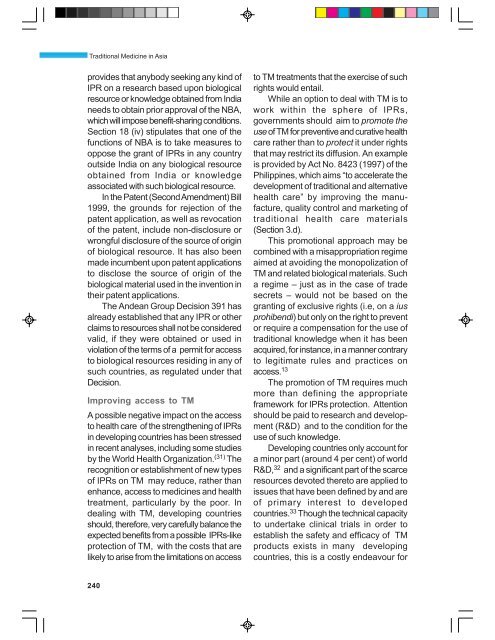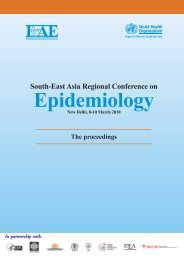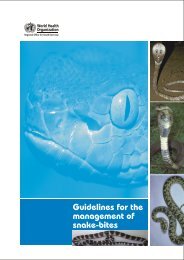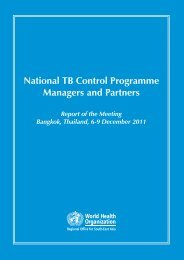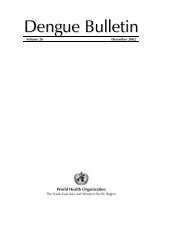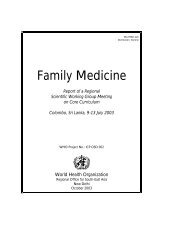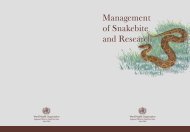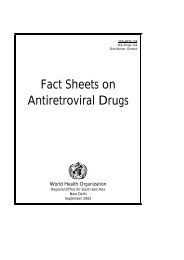Traditional Medicine in Asia
Traditional Medicine in Asia
Traditional Medicine in Asia
You also want an ePaper? Increase the reach of your titles
YUMPU automatically turns print PDFs into web optimized ePapers that Google loves.
<strong>Traditional</strong> <strong>Medic<strong>in</strong>e</strong> <strong>in</strong> <strong>Asia</strong><br />
provides that anybody seek<strong>in</strong>g any k<strong>in</strong>d of<br />
IPR on a research based upon biological<br />
resource or knowledge obta<strong>in</strong>ed from India<br />
needs to obta<strong>in</strong> prior approval of the NBA,<br />
which will impose benefit-shar<strong>in</strong>g conditions.<br />
Section 18 (iv) stipulates that one of the<br />
functions of NBA is to take measures to<br />
oppose the grant of IPRs <strong>in</strong> any country<br />
outside India on any biological resource<br />
obta<strong>in</strong>ed from India or knowledge<br />
associated with such biological resource.<br />
In the Patent (Second Amendment) Bill<br />
1999, the grounds for rejection of the<br />
patent application, as well as revocation<br />
of the patent, <strong>in</strong>clude non-disclosure or<br />
wrongful disclosure of the source of orig<strong>in</strong><br />
of biological resource. It has also been<br />
made <strong>in</strong>cumbent upon patent applications<br />
to disclose the source of orig<strong>in</strong> of the<br />
biological material used <strong>in</strong> the <strong>in</strong>vention <strong>in</strong><br />
their patent applications.<br />
The Andean Group Decision 391 has<br />
already established that any IPR or other<br />
claims to resources shall not be considered<br />
valid, if they were obta<strong>in</strong>ed or used <strong>in</strong><br />
violation of the terms of a permit for access<br />
to biological resources resid<strong>in</strong>g <strong>in</strong> any of<br />
such countries, as regulated under that<br />
Decision.<br />
Improv<strong>in</strong>g access to TM<br />
A possible negative impact on the access<br />
to health care of the strengthen<strong>in</strong>g of IPRs<br />
<strong>in</strong> develop<strong>in</strong>g countries has been stressed<br />
<strong>in</strong> recent analyses, <strong>in</strong>clud<strong>in</strong>g some studies<br />
by the World Health Organization. (31) The<br />
recognition or establishment of new types<br />
of IPRs on TM may reduce, rather than<br />
enhance, access to medic<strong>in</strong>es and health<br />
treatment, particularly by the poor. In<br />
deal<strong>in</strong>g with TM, develop<strong>in</strong>g countries<br />
should, therefore, very carefully balance the<br />
expected benefits from a possible IPRs-like<br />
protection of TM, with the costs that are<br />
likely to arise from the limitations on access<br />
240<br />
to TM treatments that the exercise of such<br />
rights would entail.<br />
While an option to deal with TM is to<br />
work with<strong>in</strong> the sphere of IPRs,<br />
governments should aim to promote the<br />
use of TM for preventive and curative health<br />
care rather than to protect it under rights<br />
that may restrict its diffusion. An example<br />
is provided by Act No. 8423 (1997) of the<br />
Philipp<strong>in</strong>es, which aims “to accelerate the<br />
development of traditional and alternative<br />
health care” by improv<strong>in</strong>g the manufacture,<br />
quality control and market<strong>in</strong>g of<br />
traditional health care materials<br />
(Section 3.d).<br />
This promotional approach may be<br />
comb<strong>in</strong>ed with a misappropriation regime<br />
aimed at avoid<strong>in</strong>g the monopolization of<br />
TM and related biological materials. Such<br />
a regime – just as <strong>in</strong> the case of trade<br />
secrets – would not be based on the<br />
grant<strong>in</strong>g of exclusive rights (i.e, on a ius<br />
prohibendi) but only on the right to prevent<br />
or require a compensation for the use of<br />
traditional knowledge when it has been<br />
acquired, for <strong>in</strong>stance, <strong>in</strong> a manner contrary<br />
to legitimate rules and practices on<br />
access. 13<br />
The promotion of TM requires much<br />
more than def<strong>in</strong><strong>in</strong>g the appropriate<br />
framework for IPRs protection. Attention<br />
should be paid to research and development<br />
(R&D) and to the condition for the<br />
use of such knowledge.<br />
Develop<strong>in</strong>g countries only account for<br />
a m<strong>in</strong>or part (around 4 per cent) of world<br />
R&D, 32 and a significant part of the scarce<br />
resources devoted thereto are applied to<br />
issues that have been def<strong>in</strong>ed by and are<br />
of primary <strong>in</strong>terest to developed<br />
countries. 33 Though the technical capacity<br />
to undertake cl<strong>in</strong>ical trials <strong>in</strong> order to<br />
establish the safety and efficacy of TM<br />
products exists <strong>in</strong> many develop<strong>in</strong>g<br />
countries, this is a costly endeavour for


